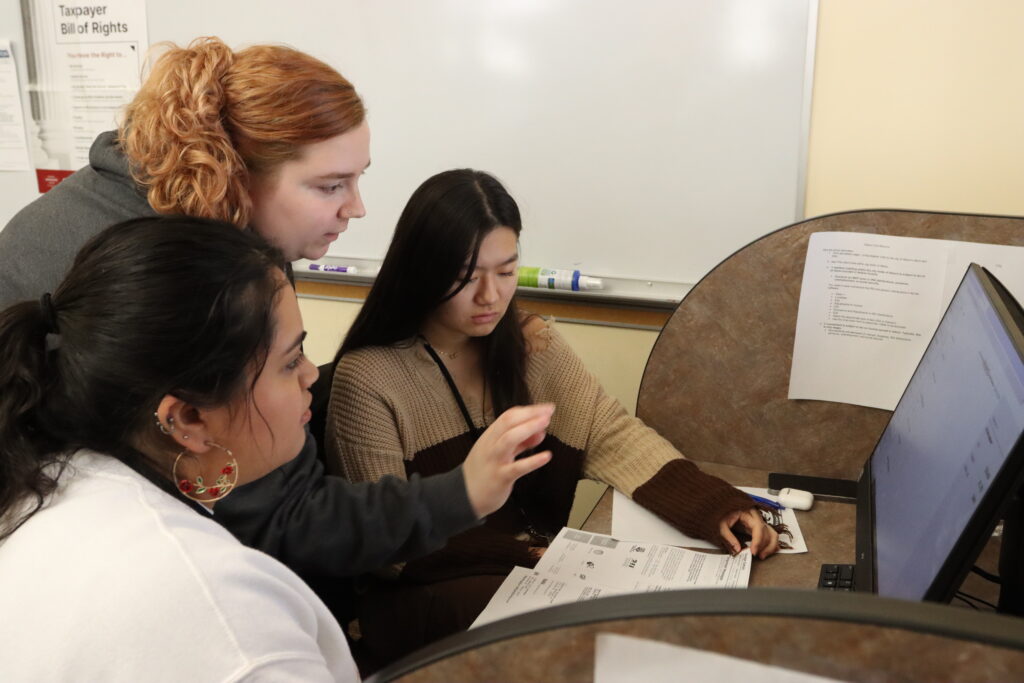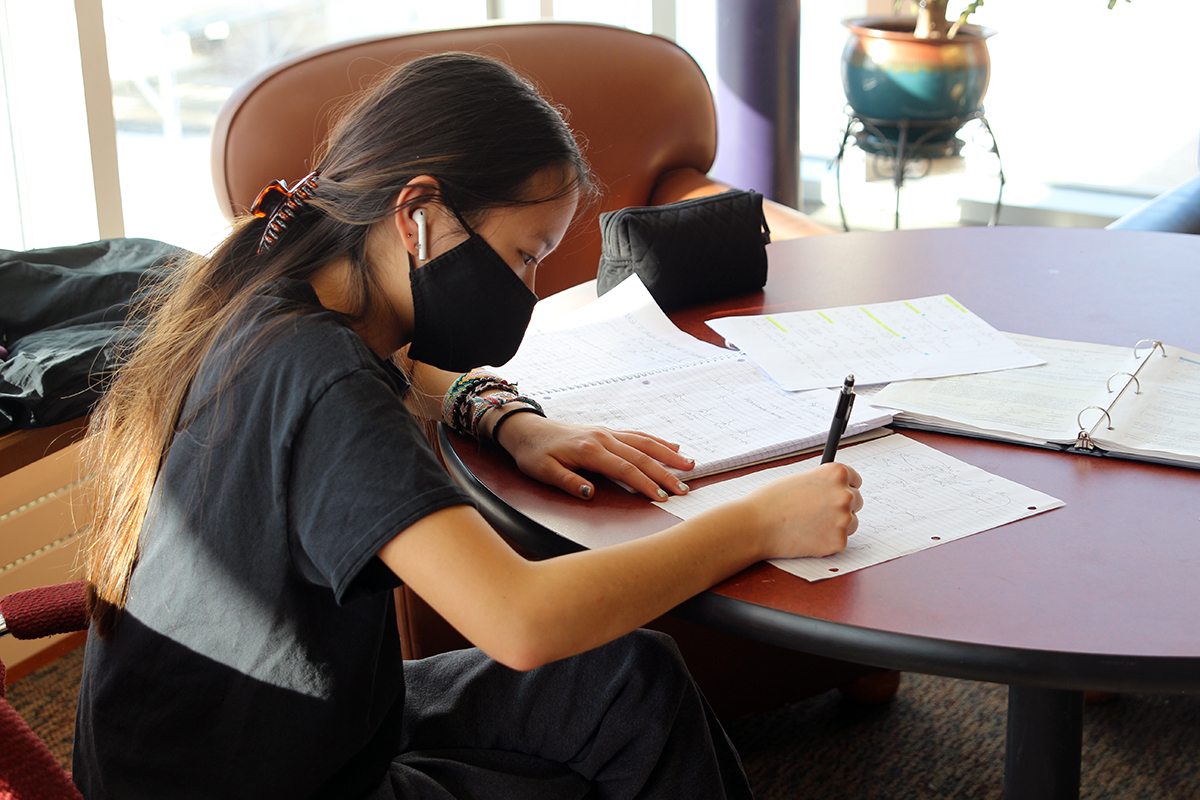Accounting students gain hands-on training volunteering with VITA community tax program
Related Programs
Related Posts
Connect With Us
September 13, 2024
For Kevie Lamour ’25, it was a journey into something with which she really wasn’t that familiar.
It was a journey of forms and deductions; of exemptions and refunds; of W-2s and 1040s; of donations and expenditures.
The Haiti native came to Albion College and settled on political science as her major before recently adding economics to her plate. So when she volunteered over the winter to join other Albion students to help local residents fill out their taxes, she admitted with a laugh, “I didn’t know what the heck I was doing.”
But she does now. And what she and the other student volunteers learned was far more important, and educational, than refunds and dependents.
“It was the first time I had to think about filing taxes and every case is different,” she said. “But for me, it’s the personalized touch to it. We try to make it as personal as possible. I just want to help people go through it and it’s just nice to give something back.”
It’s been some 20 years since retired economics professor Gaylord Smith created the Volunteer Income Tax Assistance (VITA) program to help those in need in the Greater Albion community navigate the complicated waters of tax preparation and filing.
It was an opportunity, he believed, to help those who could use a hand with one of the necessary, often exhausting, frequently annoying, and sometimes expensive realities of American life. And it can be especially tough on older filers and those with limited financial means, who need to file but can’t really afford to go to an accountant or a tax service.
So two times a week initially and then once a week as tax season drew to a close, VITA volunteers gathered in shifts in Room 106 of Robinson Hall to help with tax conversations, to answer questions, make suggestions, help fill out the forms and, finally, e-file returns.

Albion College students participating in the Volunteer Income Tax Assistance program.
The program has remained popular over the years as more than 1,000 people have used it.
“A lot of people in the community know about us,” said adjunct economics professor Leah Parker-Roth ’15, who along with professor Connie O’Brien and alumna Ashlin Tabiadon ’17, coordinated the student volunteers this season. Renee Harlow ’12 schedules and organizes appointments and solves the various logistical issues.
“We have a lot of return clients,” Parker-Roth said.
Parker-Roth ’15 knows the program better than most because she’s been here before. As an Albion College student who double majored in accounting and business and organizations, she volunteered in VITA for four years and gained valuable insight on not only how to work through taxes, but how to work with people.
She took that experience and turned it into a job with a small accounting firm before finding an unexpected opportunity to return to her alma mater as an economics professor. Economics professor John Bedient, who took the mantle from Smith, recently handed the VITA program over to Parker-Roth. Fellow economics professor John Carlson also devoted a decade to the development and progress of the program. Bedient has been a long-time advocate for the program and will return as its leader this year.
“It’s a chance to give back to the community and have students get some real-world work to go with their book knowledge,” he said. “We teach them about the effect of taxes at the 30,000-foot level in class. But this is down and dirty and it’s putting numbers in boxes.”
Those interested in volunteering must first complete and pass three IRS-mandated courses over a two-day training session in January. The courses focus on professional ethics, tax law, and discussing tax returns with clients.
“It can be difficult,” Maya Batjargal ’26 said. “The documents are different for everyone and sometimes there are questions about why someone got a lesser refund. You have to be ready for unexpected questions.”
At the beginning of tax season, VITA was open twice a week in Robinson Hall for at least three hours. Appointments are set up and volunteers take customers through the entire process of consultation, gathering important documents, and helping them fill out their local, state, and federal tax forms.
The taxes are filed on the IRS-approved Taxslayer software and, after the numbers are plugged in, Parker-Roth examines the returns before they’re e-filed. Volunteers are allowed to only work on basic 1040 taxes. And if students run into a tax roadblock, the professors are there to provide guidance.
Parker-Roth said the experience for students is invaluable.
“It gives them an understanding of professionalism and understanding [of] the diligence of this type of work,” she said. “Whatever realm of business you go into, you have to be diligent and responsible. It also shows them how not only to work with clients but with their student peers. It gives them real-world experience.”
VITA also provides an opportunity for the volunteers to gain academic credit as participants in the program. But the practical experience is what really matters, Bedient said, such as learning attention to detail, working collaboratively, and interacting with the public.
“It is an opportunity that employers value,” Bedient said. “Once students put VITA on their resume in an interview, an employer’s ears perk up. They know they must pass an IRS test that’s not easy. Also, employers know VITA requires students to demonstrate with each client valued behaviors like attention to detail, active listening, and collaborative, problem-solving skills.”
The VITA program this year featured an array of students, many of them who are majoring in accounting and economics, but some of them who are just interested in helping.
The volunteers this winter included: Maralgoo Ariunbaatar ’26; William Barr ’25; Gerelmaa Batjargal ’26; Enkhmaa Buyanbadrakh ’26; Mateo Diaz ’24; Alexis Glaser ’25; Kevin Herrera ’26; Kevie Lamour ’25; Stephanie Ledezma Gonzalez ’24; Juan Lopez ’24; Canon Rose ’25; Maiwand Zahin ’26; and Jadlyn Riley ’24.
“I wanted to get some real-life hands-on experience,” said Enkhmaa Buyanbadrakh ’26, a native of Mongolia who is an accounting major. “I’ve learned a lot from this. I’ve taken so many accounting classes but this helps me with hands-on learning.”
And Bedient believes the program remains as vital and important as ever.
“This is a way to do charitable work in the community and that’s been my biggest benefit from it,” he said. “I can also help students help community members. We’ve gotten a lot of good vibes helping people who really need help.”
